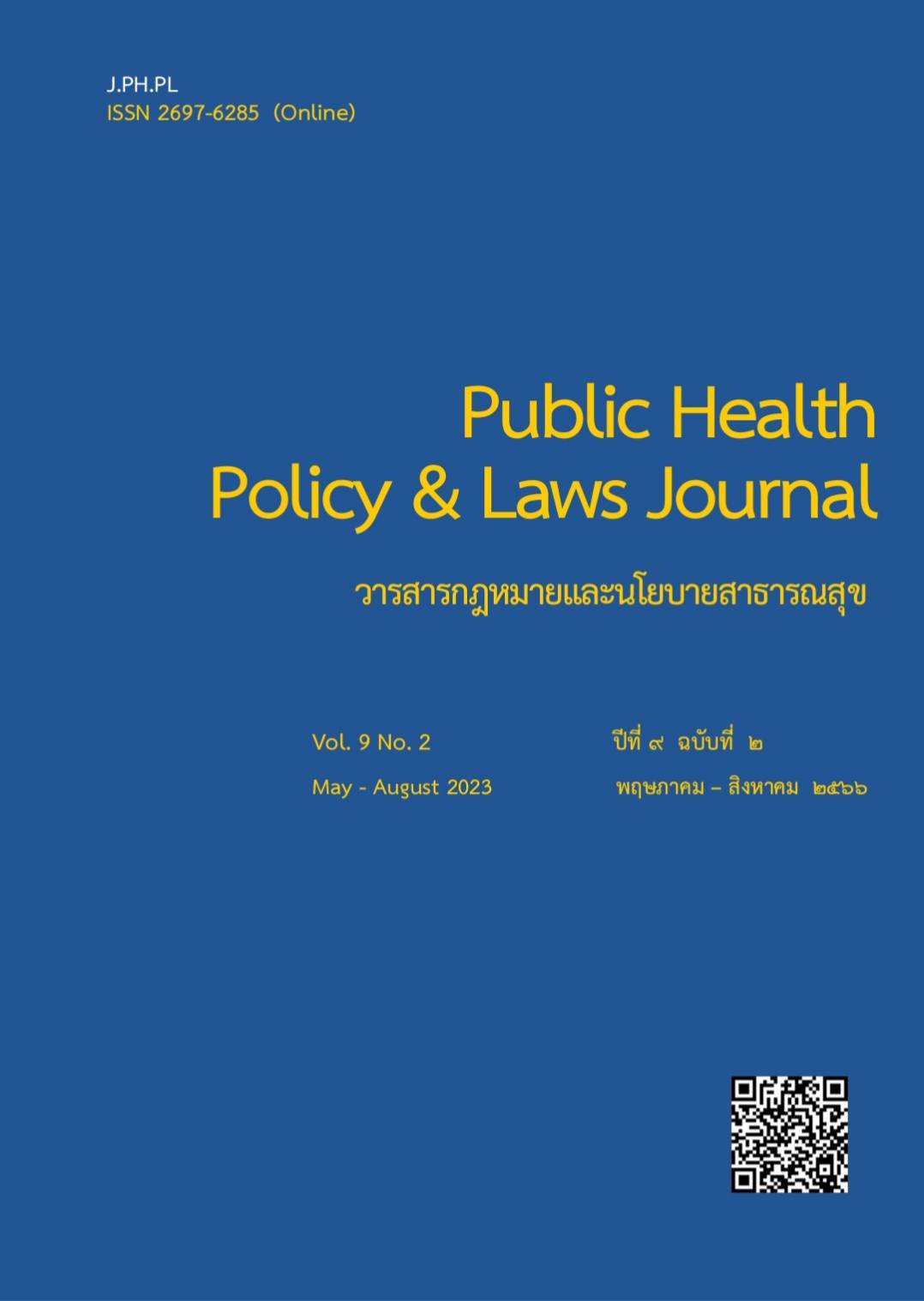Happiness at work of nurses in Public Health Centers, Bangkok Metropolitan Administration
Keywords:
Happiness at work, Job characteristics, Work environmentAbstract
This cross-sectional survey research aims to study the happiness at work among registered nurses working in Public Health Centers, Bangkok Metropolitan Administration. The sample consisted of 285 nurses, selected from 69 Public Health Centers. Data were collected by self-administered questionnaires between October - December 2022. Statistics used for data analysis were percentage, mean, median, minimum, maximum, standard deviation, Pearson’s correlation coefficients, and stepwise regression analysis.
The study found that registered nurses had overall happiness at work at a high level. (mean 4.56) Overall, Job characteristics and work environment was at a high level (means 4.46 and 4.21). Job characteristics and working environment had a statistically significant relationship with happiness at work. (r=0.591 and r=0.589, p<0.001) Social work environment, skill variety, feedback, organization work environment and task significant can predict happiness at work among registered nurses working in Public Health Centers, Bangkok Metropolitan Administration was 50.6% (R2 = 0.506, p<0.05)
Therefore, administrator should have a policy to promote happiness at work by encouraging activities that create a good atmosphere in the workplace and determine the workload that is suitable for the person and position. To increase the motivation to work job satisfaction. Achieve greater efficiency and reduce the rate of absenteeism or resignation from work.
References
Benjaporn Kongbulyapong and Duangkamol Pinchaew. (2016). Factors Influencing Happiness at Work of Professional Nurses. community hospital Surat Thani Province. Journal of Police Nurses, 8(2), 151–160.
Boonchuay Silamom, Wannee Deawisaret, and Aree Ratkhamyu. (2018). Factors influencing job retention of Generation Y professional nurses in a hospital. Journal of Nursing and Health Care, 36(1), 62-71.
Copanitsanou, P., Fotos, N., and Brokalaki, H. (2017). Effects of work environment on patient and nurse outcomes. British Journal of Nursing, 26(3), 172-176.
Daniel, W.W. (2005). Biostatistics: A foundation for analysis in the health sciences (8th ed.). The United State of America: John Wiley & Sons.
Department of Health, Bangkok Metropolitan Administration. (2017). Annual Government Action Plan 2022, Bureau of Health. Retrieved March 11, 2022, from https:// webportal.bangkok.go.th/public/user_fileseditor/101/2565/Plan/AllPlanDOH65_final.pdf
Gold, J. A. (2020). Covid-19: adverse mental health outcomes for healthcare workers. Bmj, 369.
Hackman J. R., Oldham, G. R. (1976). Motivation through the Design of Work: Test of a Theory. Organizational Behavior and Haman Performance, 16, 250-279.
Koporlarp Aphaiphak. (2020). Happy Corporate Atmosphere: Happy People, Successful Jobs. Journal of MCU Humanities Review, 8(1), 315-331.
Komkrit Suravet. (2011). Happiness in work of personnel under Chumphon Provincial Public Health Office (master's thesis). Chiang Mai: Chiang Mai University
Jirapa Panyakamphol. (2013). Factors Affecting Happiness at Work of Registered Nurses in Private Hospitals in the Eastern Region. Social Science Journal, 2(2), 104-108.
Laddawan Samran and Thitiporn Phakdeewong. (2019). Factors of working life quality and factors of perception of working environment affecting happiness at work of personnel of Phra Nakhon Si Ayutthaya Provincial Cooperative Office. Academic Journal of Rajamangala University of Technology Suvarnabhumi, 4(1), 23-33.
Management Strategy Division Office of Strategy and Evaluation. (2020). Statistics of Bangkok, 2020. Retrieved March 16, 2022, from https://webportal.bangkok.go.th/upload/user/00000130/BMA_STATISTICS%202563/ebook%2063.pdf
Manion, Jo. 2003. Joy at work: Creating a positive workplace. Journal of Nursing Administration. 33(12), 652-655.
Nantaporn Thonglim and Chuanchuen Akkawanitcha. (2021). The Effects of Relationships at Work and Job Insecurity on the Willingness to Resign through Work Happiness. In the 9 th National Academic Conference (N. 83-95). Phetchaburi: Faculty of Science, Silpakorn University.
National Productivity Institute. (2009). Effective work, happy people (Healthy organization productivity). Bangkok: Eastern Printing House.
Onjira Yuphichit, Atchareeya Ketpanich, Anna Hongsuwan and Sangthian Yuthao. (2020). Factors Influencing Work Happiness of Medical Record Personnel. Between government hospitals and private hospitals in Bangkok. Journal of Integrative Social Sciences, 7 (2), 129–142.
Phatradanai Chalongboon. (2018). Happiness in the performance of government personnel. Journal of Peace Studies Review MCU, 6, 590-599.
Rachaneekorn Panwong, Aree Cheewakasemsuk and Renukar Tongkhamrod. (2020). Happiness in the work of professional nurses at Surin Hospital. Nursing Journal, 69(3), 11-19.
Thatcharin Wuthichat. (2018). Employee happiness is the foundation of the organization. Bangkok: Bangkok Business.
Verschuren, R. et al. (1996). Working Conditions in Hospitals in the European Union. Ireland: Longhlinstown House.
World Health Organization. (2021). Global strategic directions for nursing and midwifery 2021-2025. Retrieved March 15, 2022, from https://apps.who.int/iris/bitstream/handle./10665/344562 /9789240033863-eng.pdf
Downloads
Published
How to Cite
Issue
Section
License
Disclaimer and Copyright Notice
The content and information presented in articles published in the Journal of Law and Public Health Policy represent the opinions and sole responsibility of the respective authors. The editorial board does not necessarily agree with or assume any responsibility for the views expressed.
All articles, data, content, images, and other materials published in the Journal of Law and Public Health Policy are the intellectual property of the journal. Any individual or organization wishing to reproduce, distribute, or otherwise use the entirety or any part of such materials must provide proper citation.





